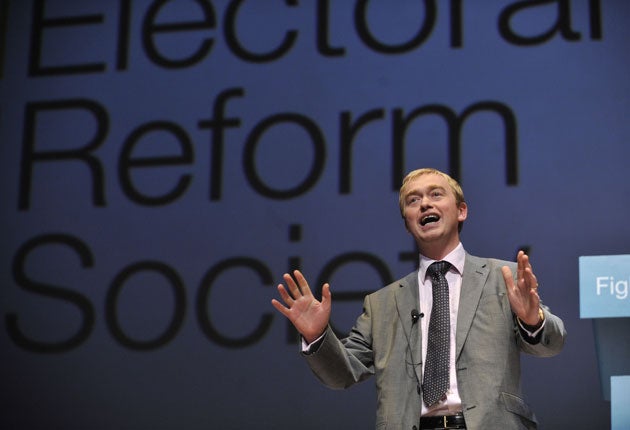Long-term Tory pact 'raving mad', says new Lib Dem president
Tim Farron risks raising hackles within the coalition as Nick Clegg pledges that 'plural politics is here to stay'

Your support helps us to tell the story
From reproductive rights to climate change to Big Tech, The Independent is on the ground when the story is developing. Whether it's investigating the financials of Elon Musk's pro-Trump PAC or producing our latest documentary, 'The A Word', which shines a light on the American women fighting for reproductive rights, we know how important it is to parse out the facts from the messaging.
At such a critical moment in US history, we need reporters on the ground. Your donation allows us to keep sending journalists to speak to both sides of the story.
The Independent is trusted by Americans across the entire political spectrum. And unlike many other quality news outlets, we choose not to lock Americans out of our reporting and analysis with paywalls. We believe quality journalism should be available to everyone, paid for by those who can afford it.
Your support makes all the difference.The new president of the Liberal Democrats last night dismissed the idea of a long-term pact with the Tories as "absolutely stark raving mad".
In comments likely to raise the hackles of traditional Conservatives, Tim Farron told The Independent on Sunday his politics is "very much built upon an anger at the injustice" of Margaret Thatcher's premiership.
"The fact there's a good working relationship is something we should celebrate, but not assume there is any kind of attempt to assimilate," he said, just hours after defeating ex-MP and former London mayoral candidate Susan Kramer to the presidency by 14,593 votes to 12,950. "You would have to be absolutely stark raving mad to think there's any chance of a merger or closer relationship or a pact with the Conservatives." Lib Dems will contest every seat, he added.
But the remarks will disappoint many in the coalition who have hinted at the two parties moving closer together. Nick Boles, a Conservative MP close to David Cameron, proposed a formal electoral pact, while fellow Tory David Mowat suggested that in the event of the introduction of the Alternative Vote, Lib Dems would rank Tories second and vice-versa.
Nick Clegg, the Deputy Prime Minister, will this week use a speech to the Hansard Society to suggest the Lib Dems will remain in power far beyond the next election, insisting "plural politics is here to stay".
"You can engage with it or shout at it but do not doubt for one moment our resilience or resolve," he will say. The Lib Dems came under further pressure yesterday over revelations that pre-election plans were drawn up to jettison the pledge to abolish tuition fees, though party managers insist it was just part of preparing for coalition talks. Labour sought to exploit the revelation, claiming it further undermined Mr Clegg's credibility.
Despite his new status, Mr Farron insists he will vote against plans to increase tuition fees to £9,000, though he welcomed the "progressive" concession that part-time students will no longer pay fees upfront. He said the sight of 50,000 students protesting against the proposals made him feel "nostalgic" for his radical youth, but he condemned the "tiny minority" who turned violent.
He will use the role to appease grassroots activists by pointing out "wins" that the Lib Dems have secured over the Tories, after several weeks in which the smaller party has received "zero recognition". "For the first time ever a British government stood up to Murdoch [over buying BSkyB]. Have we got any credit for that?"
However, he will also have to placate members who fear coalition policy – particularly spending cuts – will hit the poor hardest.
Rachel Smith, wife of Vince Cable, the Secretary of State for Business, has become the latest figure to speak out against government plans to time-limit council-house tenancies. Ms Smith, who heads a rural housing association in the New Forest, said the proposal would create a "nightmare" for tenants facing review every five years. She said a different approach was needed to free up homes for the most needy.
"It is a seriously bad idea, though it tries to deal with a real problem," she says, writing in Lib Dem grassroots magazine, Liberator.
Join our commenting forum
Join thought-provoking conversations, follow other Independent readers and see their replies
Comments